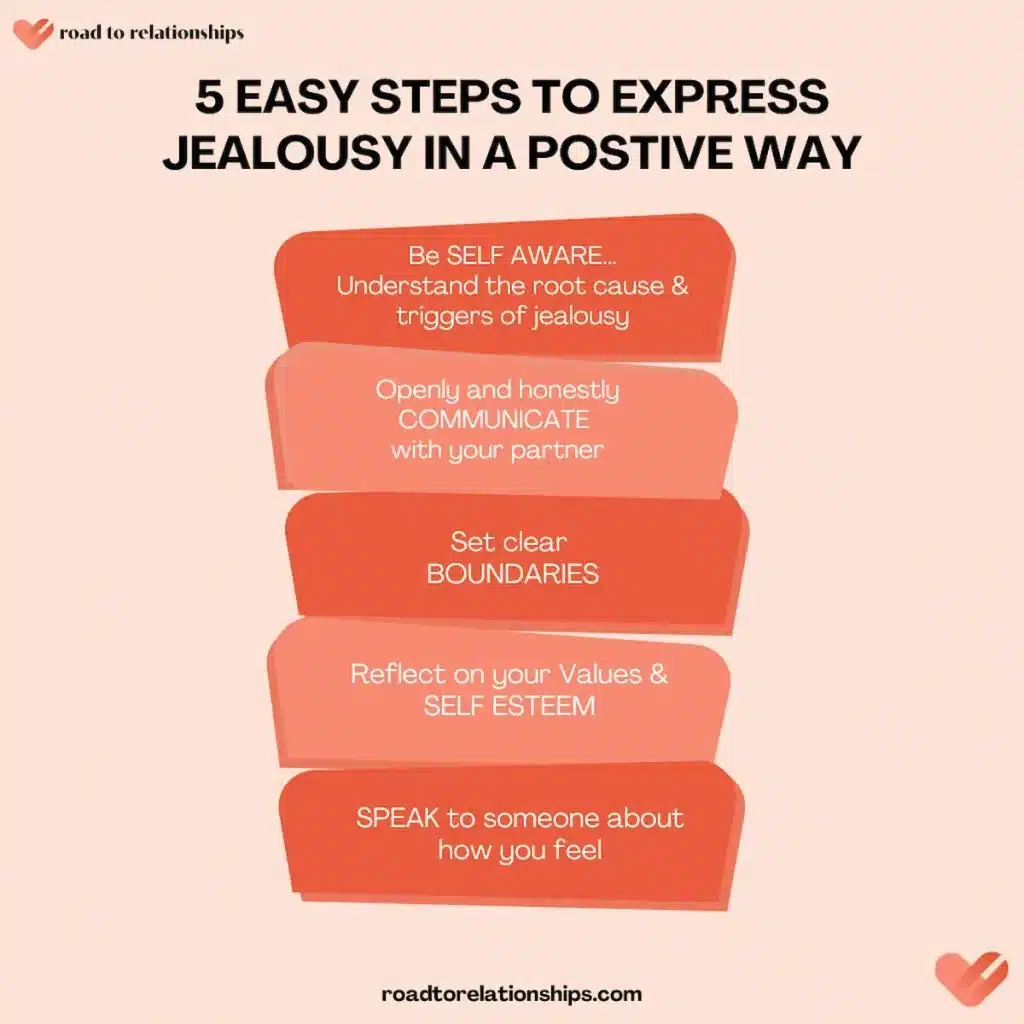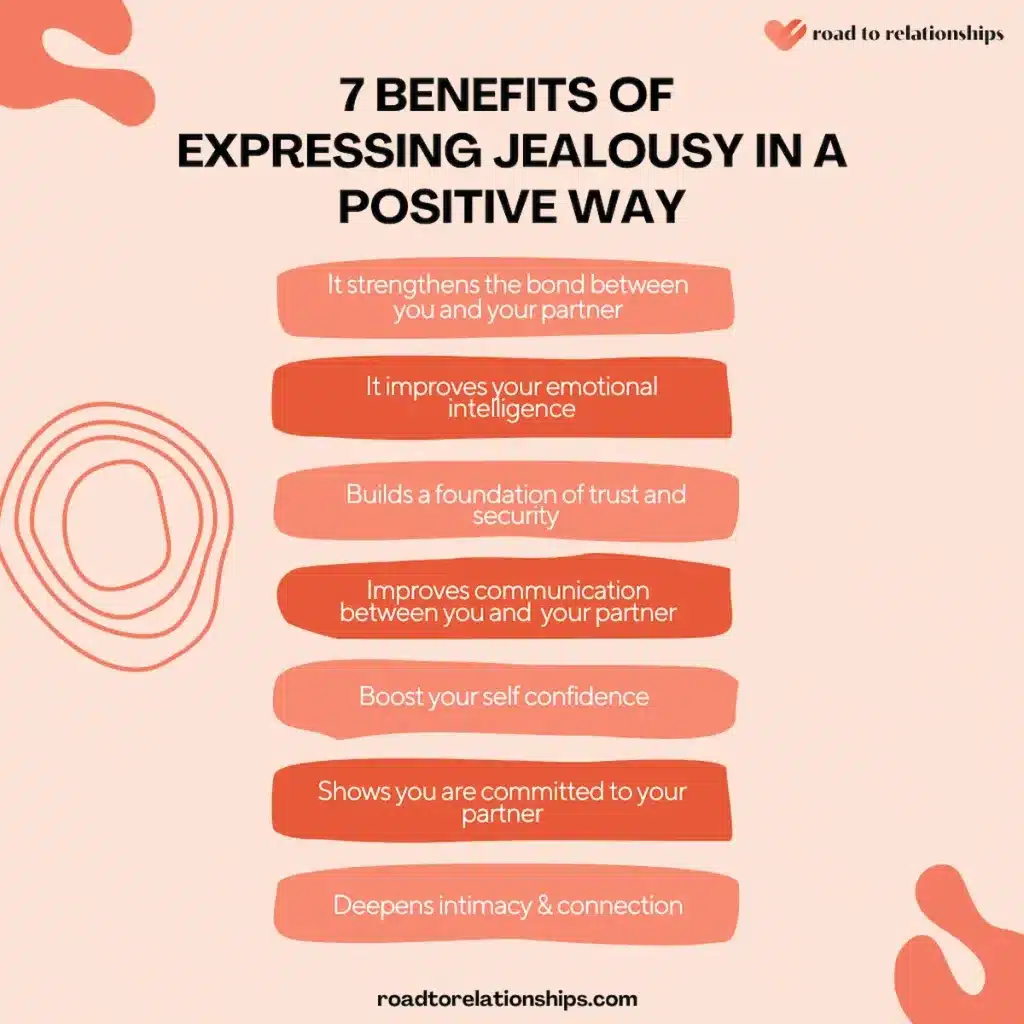
Beste Güneysu Şeker
Contributor

Emma Reliason
Contributor
Beste Güneysu Şeker is a clinical psychologist, while Emma Reliason is a graduate with B.A. in Psychology. Their expertise greatly enriched this article and played a crucial role in our commitment to delivering accurate and informative content.
Jealousy, often associated with negative feelings and tumultuous relationships, is a complex and inherent human emotion.
I bet we’ve all felt a twinge of jealousy when our partner hangs out with a friend more than with us, especially if they don’t talk to us about it.
It’s easy to see why feelings of mild jealousy could stem from this situation. Believe it or not, being able to express jealousy positively can deepen trust and mutual understanding.
What if we could unlock the potential of jealousy and transform it into a constructive force for personal growth and a healthy relationship?
In this article, we’ll explore how to express jealousy in a positive way, as well as highlight the benefits it can bring to our relationships and overall well-being.
Table of Contents

Jealousy is a complex emotion. It can be toxic and leave us feeling drained, insecure, and unhappy with our relationship and romantic partner.
While incredibly difficult, it’s not impossible to learn how to express jealousy in a positive way.
Here are our essentials for taking steps to learn how to express jealousy in a positive way:
1. Develop Self-Awareness and Emotional Regulation
Recognizing and acknowledging one’s jealous feelings is the first step in learning how to express jealousy in a positive way.
Understanding the root causes and triggers of jealousy within yourself is essential.
If you find yourself struggling with jealousy, it’s important to understand the root causes and triggers that may be at play:
- Abandonment Issues: For some, it may stem from abandonment issues, a fear of losing someone they care about deeply.
- Feelings of Inferiority: For others, it may be more about feelings of inferiority – a belief that they are not enough or that they will never measure up.
- Insecure Attachment Style: In some cases, an insecure attachment style may be to blame – leading to a constant need for reassurance and validation.
Beste Güneysu Şeker found that, in accordance with Abraham Maslow’s widely accepted hierarchy of needs, the significance of self-actualization cannot be understated.
“A person who struggles to control their emotions has to handle negative thoughts and their potential consequences throughout their life. Feeling inadequate is one of the negative emotions that individuals who haven’t achieved their potential often go through.”
“An inadequate feeling is closely linked to various negative emotions and behaviors, and it also triggers jealousy in relationships. Overcoming this sense of inadequacy will also get rid of jealousy. To achieve self-realization, it is essential for someone to pursue their material and spiritual goals and put in maximum effort to attain them.”
“A way to overcome inferiority complex and feelings of inadequacy is to surround yourself with as many positive people as possible. Positive people remind you how to treat yourself. They remind you of the value they give you and your talents.”
Whatever the cause may be, taking the time to dig a little deeper can help us better understand and manage those difficult emotions.
By practicing emotional regulation techniques such as deep breathing or mindfulness, individuals can manage intense emotions and respond to jealousy more constructively.
2. Engage in Honest and Open Communication
Communication is vital when it comes to how we can express jealousy in a positive way.
Experts emphasize the importance of having honest and productive conversations with your romantic partner.
When aiming to communicate your feelings of jealousy in a constructive manner with your partner, it’s essential to avoid accusatory language. According to Emma Eliason, a psychology major at the University of Minnesota-Twin Cities, this is because accusations can swiftly put the other person on the defensive, generating tension and potentially exacerbating the situation.
Eliason emphasizes that the goal is to prevent your partner from feeling attacked or blamed, recognizing that jealousy is your emotion and not something they are personally responsible for.

Focus on sharing your personal values and insecurities, allowing for a deeper understanding and empathy between both individuals.
Couples can work together to find solutions and strengthen their bond by engaging in productive conversations.
3. Establish Clear Relationship Boundaries
Setting and respecting boundaries is crucial in any successful relationship.
Setting boundaries can often be seen as limiting or restrictive, but in reality, boundaries are essential for establishing what is acceptable and what may trigger feelings of jealousy.
Some examples of relationship boundaries that can help avoid romantic jealousy include:
- Avoiding close friendships with exes
- Disclosing plans for hanging out with friends of the opposite sex
- Agreeing on appropriate social media behavior.
Remember, setting clear boundaries doesn’t mean you’re being controlling or untrusting. It means you’re taking proactive and healthy steps to maintain a strong relationship.
4. Focus on Personal Growth and Self-Improvement
Believe it or not, jealousy can be an opportunity for personal growth and self-reflection.
While jealousy often evokes strong feelings of anger, what if we looked at it from a different angle?
When we feel jealous, it might be because our personal values are being challenged in some way. This presents an opportunity to re-examine what we truly value in ourselves and our relationships.
First, take a moment to analyze the underlying reasons behind your jealous feelings. Are there any trust issues or insecurities that need addressing? Next, work on developing a positive self-image and enhancing self-esteem.
Personal growth benefits the individual and contributes to the overall health of your current relationship.
Redirect yourself to your passions, hobbies, and positive qualities, which can help alleviate feelings of inferiority and contribute to a successful partnership.
5. Seek Professional Support if Needed
Sometimes, positively expressing jealousy may require the guidance of a professional. Couples therapy can provide a safe space to address underlying trust issues, insecurities, or past relationship experiences contributing to jealousy.
A trained therapist can offer valuable insights, teach effective communication techniques, and provide tools to manage and express jealousy more healthily.
Seeking professional support is a proactive step toward nurturing a successful and fulfilling relationship. Even reaching out for one-on-one therapy can be incredibly insightful for you and your partner.
7 Benefits of Expressing Jealousy In a Healthy Way
We’ve all been there – maybe our partner got a little too friendly with someone else, or a friend got the promotion we wanted, and suddenly we’re feeling that familiar pang of envy.
But instead of letting that jealousy take over and turn into resentment or anger, what if we learned how to express it in a positive way? It’s definitely not easy, but the benefits are many.
1. Strengthening Romantic Relationships
Expressing jealousy in a positive way can strengthen the bond between romantic partners.

It’s all too common for a jealous partner to keep those feelings bottled up out of fear of appearing controlling or possessive, but According to Rodriguez, DiBello, & Neighbors, this can actually make the situation worse.
How? Well, think of it like this:
Have you ever tried holding your breath for as long as you could underwater? It’s a lot like bottling up your emotions.
It might feel okay for a little while, but eventually, you’re going to run out of air. When you bottle up your emotions in a relationship, you’re essentially cutting off the oxygen supply.
Sure, you might be able to hold your breath and keep everything inside for a little while, but eventually, you’re going to come up gasping for air.
The longer you hold your emotions in, the harder it is to let them out. And when you finally do let them out, it can be like a tidal wave – overwhelming and destructive to the relationship.
Emotions are meant to be expressed. They’re an important part of who we are and how we connect with others.
2. Developing Emotional Intelligence
Learning to express jealousy positively involves understanding and managing negative emotions. This process helps individuals develop emotional intelligence – which is crucial for navigating complex emotions in relationships.
But what exactly is emotional intelligence? According to Help Guide, emotional intelligence is the ability to identify, understand, and manage one’s emotions while also being able to recognize and empathize with the emotions of others.
By expressing jealousy in a healthy manner – such as acknowledging our feelings, finding constructive ways to overcome our insecurities, and celebrating the successes of others – we can develop our emotional intelligence and ultimately improve our relationships and overall well-being.
Beste Güneysu Şeker emphasized that emotional intelligence is characterized by the assessment of an individual’s capability and capacity to comprehend, predict, handle, and guide their own or others’ emotions.
Furthermore, Şeker highlighted the crucial role emotional intelligence plays in the establishment, evolution, sustainability, and enhancement of personal relationships. To enhance our emotional intelligence, the following approaches can be adopted:
Reducing Negative Thoughts
For example, the friend you called did not return to you. Instead of immediate blame, it would be more suitable to consider other reasoning, such as “I think he is very busy. He will return at a suitable time” or “His phone may be off.”
Composure and Stress Management
If you feel nervous and anxious, wash your face with cold water and get some fresh air; the coolness will help reduce your anxiety level. If you are feeling scared, depressed, hopeless, or discouraged, you can try an intense aerobic exercise, which can help you get energized.
Keep Your Heads Up!
The difficult circumstances of life can frustrate our hope and optimism and cause us to fail in our plans for success. We should ask ourselves the following questions in every difficult situation we face:
- “What lesson can I learn from this experience?”
- “What is important to me now?”
- “If I think differently than usual, can I find better answers or solutions for my problem?”
3. Fostering Trust and Security
A positive expression of jealousy helps address trust issues in relationships.
By engaging in honest communication and productive conversations, partners can establish a foundation of trust and security, which makes them feel more confident in the relationship and reduces the likelihood of jealousy escalating into unhealthy emotions or behaviors.
Not only that but learning how to communicate a healthy display of jealousy can also convey how much you care for someone and how important they are to you.
4. Enhancing Communication Skills
Learning to express jealousy positively requires honing communication skills. It involves active listening, expressing oneself clearly and non-confrontationally, and practicing empathy.
Effective communication is a crucial part of any successful relationship, whether it’s with a romantic partner, family member, or friend.
As adults, we encounter all kinds of situations where we must clearly express ourselves, from navigating work relationships to advocating for our needs in healthcare settings.
Having strong communication skills helps us build trust, foster understanding, and ultimately lead to better outcomes in all areas of our lives.
5. Boosting Self-Confidence
Rather than letting jealous feelings consume us, there’s a way to express jealousy healthily that can boost our self-confidence.
When we acknowledge our jealous thoughts and communicate them openly and honestly, we can better understand our desires and identify areas where we want to improve ourselves.
This self-awareness can help us feel more confident in who we are and what we want from life. So next time you’re feeling a hint of romantic jealousy, don’t be afraid to confront it head-on and use it as an opportunity to grow in self-confidence.
Beste Güneysu Şeker concluded that self-confidence is a personal trait that distinguishes individuals in society and contributes to their success. Demonstrating self-confidence also serves as an indicator of self-respect. It is crucial to acknowledge that to earn respect from others, we must first have respect for ourselves.
For this reason, we should consider the following few methods to increase our self-confidence.
Write down everything you write without thinking that people will read it.
Write down what you went through that day, your ideas or dreams. Maybe you can go a little further and write poems and stories. Thus, you can find the opportunity to talk to yourself by writing and increase your expression and speaking skills while exploring your inner world. You can make your ideas more workable and feel great.
There is no such thing as “people with high self-esteem are never afraid.” This ain’t right. Maybe you’re scared to talk in front of a bunch of people, introduce yourself to a stranger, or ask your boss for a raise.
But guess what? When you actually face those fears, you’ll boost your self-confidence like no other!
Picture a little baby learning to walk. So many chances to fall, right? Well, when that baby finally conquers its fear, there’s a huge smile on its face. So go on, push past your fears, and show ’em who’s boss!
6. Nurturing a Supportive Environment
Positive expression of jealousy fosters a supportive environment within the relationship.
Partners who express jealousy constructively demonstrate their commitment to each other’s well-being and emotional security.
Nurturing a supportive environment creates a supportive atmosphere where both partners can openly express their emotions and needs, leading to a more nurturing and fulfilling relationship.
7. Cultivating Intimacy and Connection
When expressed positively, jealousy can deepen intimacy and strengthen the connection between partners.
By addressing and resolving jealousy-related issues, couples better understand each other’s insecurities, fears, and desires, promoting emotional closeness and strengthening the relationship’s emotional bond.
Conclusion
You should have everything you need now to go and deal with your jealous feelings, but it won’t be easy!
Expressing jealousy in a positive way is a continuous journey that requires self-awareness, open communication, and massive personal growth.
Individuals can sustain healthy relationships by understanding the complexity of jealousy, establishing healthy boundaries, and seeking professional help if necessary.
In addition, you can transform jealousy into an opportunity for growth and strengthening the bond between partners, love and trust can flourish, creating a foundation for a successful and fulfilling relationship.







